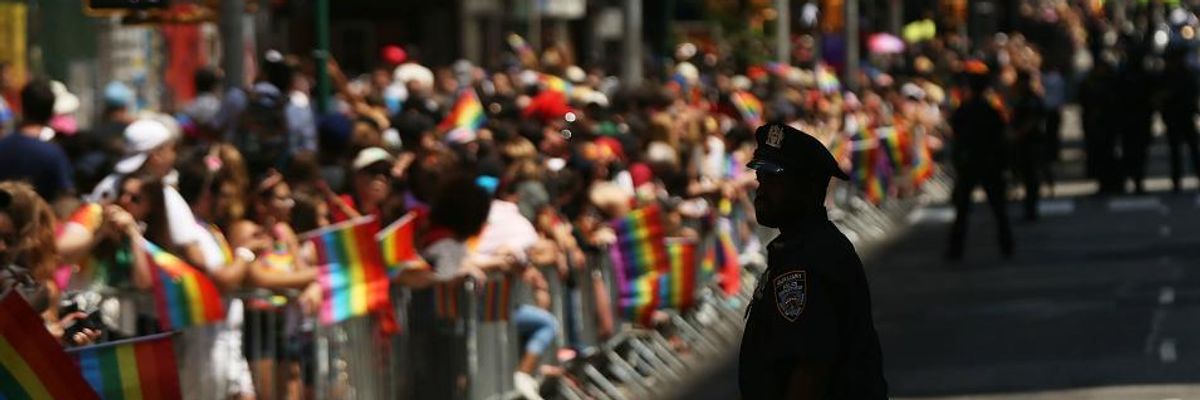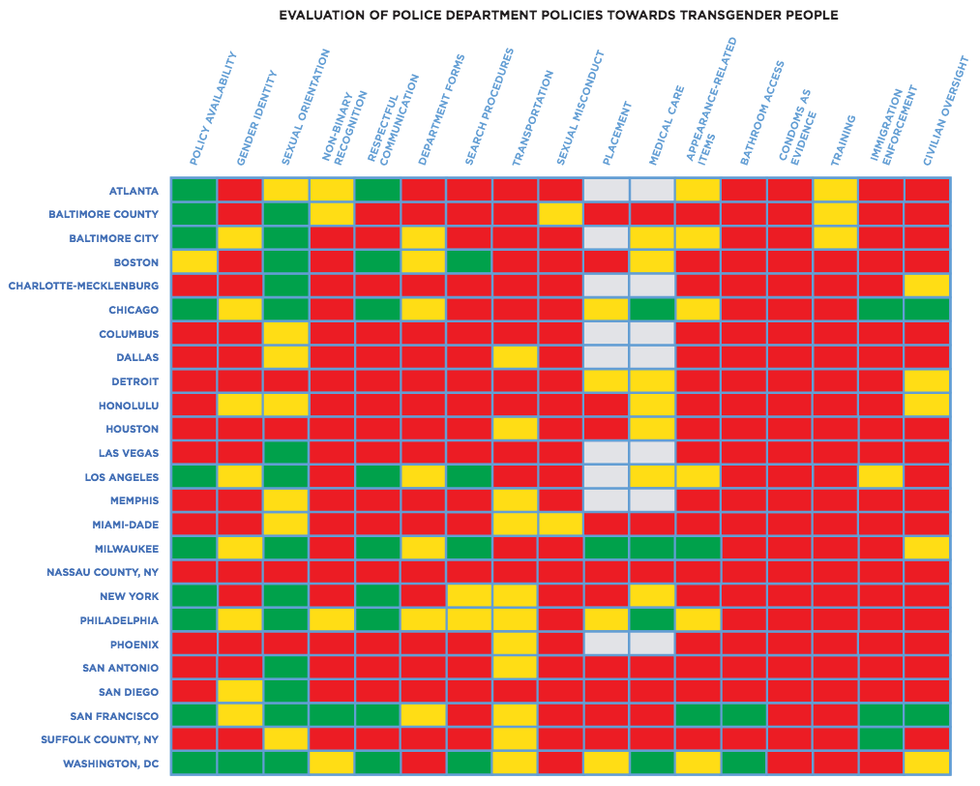
A police officer stands guard as participants in the annual New York Gay Pride Parade, one of the oldest and largest in the world, make their down 5th Avenue in Manhattan on June 25, 2017 in New York City. (Photo: Spencer Platt/Getty Images)
New Report Exposes 'Widespread Failure' of US Police to Protect and Serve Transgender People
"Police departments must evolve to meet the needs of the communities they have sworn to serve."
A new report published Tuesday exposes the "widespread failure" of police forces across the United States to adequately protect and serve transgender people, and offers model policies and best practices to rectify this "systemic neglect."
"The solutions we offer can lead these communities and our nation's law enforcement to a more equitable future, but we must get there together."
--Mara Keisling, NCTE
The National Center for Transgender Equality (NCTE) worked with dozens of local and state groups to analyze how the nation's 25 largest police departments treat transgender people to produce the report, entitled Failing to Protect and Serve: Police Department Policies Towards Transgender People (pdf).
"As we make groundbreaking advancements towards transgender equality, many members of our communities continue to be affected by disproportionate contact with, and often by bias and abuse within, policing and the criminal justice system," the introduction reads.
The report points out that a recent survey found 58 percent of transgender people in the United States who encountered law enforcement in the past year said they experienced harassment, abuse, or other mistreatment.
\u201cNEW: Violence facing trans people intensifies when police depts fail to protect & serve us. #WhoProtectsUs #FailingToProtect\n@TransEquality audited the 25 largest US police depts to learn:\n\ud83d\udc49 they can improve &\n\ud83d\udc49 how they\u2019re falling short.\n\nTHREAD\n\ud83d\udc47\ud83d\udc47\nhttps://t.co/qksJAZsoYM\u201d— National Center for Transgender Equality (@National Center for Transgender Equality) 1557234164
NCTE's report issues grades for the scrutinized departments--from Atlanta to Boston to Chicago to San Francisco--based on 17 criteria, including bathroom access, department forms, medical care, respectful communication, search procedures, sexual misconduct, and training.
Over a two-year period, NCTE researchers evaluated publicly available policies and practices by "searching department websites, contacting each department, and consulting with local advocates and organizations invested in police reform."
The report features individual department summaries as well as a color-coded chart that shows whether each department generally meets (green), partially meets (yellow), or either fails to address or contradicts (red) the researchers' model policies in each category. Gray indicates the department lacks holding facilities, meaning those categories aren't applicable.

Among the researchers' key findings:
- No department explicitly requires regular training on transgender interaction policies for all members across rank.
- No department required for officers to respectfully record the name currently being used by the individual that is separate from the spaces used for legal names or aliases in Department forms.
- No Department explicitly provides for transgender individuals to be transported along with individuals of the same gender identity.
- Only two departments explicitly prohibited sexual conduct between officers and those in their custody
- Out of the sixteen departments with holding facilities, only four adequately address access to hormone medications.
- Out of the sixteen departments with holding facilities, 10 failed to provide specific guidance on housing placement for transgender individuals.
- A majority of departments (16 of 25) fail to provide search procedures for transgender individuals and/or require members to perform searches based on sex as assigned at birth or genitalia.
- Only nine of the 25 departments include gender identity and/or expression language in their non-discrimination policy, which is the best way to clarify that transgender people are protected.
"This report's findings show that while there has been some policy progress in recent years, police departments around the country have a long way to go to ensure safety and fairness and build trust with transgender communities," the report says. "We will not stop the widespread violence against trans people until we change how our communities are policed."
While the report outlines how police departments can improve their work in the 17 categories studied, NCTE also released a separate model policy document (pdf) Tuesday to help guide reforms.
"We will not stop the widespread violence against trans people until we change how our communities are policed."
--NCTE report
However, even if every proposed policy in the document were implemented, the report acknowledges, "it would not be enough to ensure that all transgender people are treated fairly by police. It is clear that the issues facing transgender people can't be separated from broader issues of police reform and oversight."
Additionally, police treatment of transgender people cannot be separated from broader societal trends and issues.
Since President Donald Trump and Vice President Mike Pence took office in 2017, the administration has enacted a series of anti-trans policies--purging transgender people from military service, enabling employment discrimination, rolling back protections for inmates, and even battling global efforts to ensure the human rights of the LGBTQ community. At the same time, hate crimes have risen, specifically hate-inspired homicides with LGBTQ victims--especially trans individuals and people of color.
"On the fiftieth anniversary of the Stonewall riots, transgender people of color remain targets of harassment, abuse, and violence," Mara Keisling, NCTE's executive director, said in a statement Tuesday.
"If we ever hope to end this crisis, police departments must evolve to meet the needs of the communities they have sworn to serve," Keisling added. "The solutions we offer can lead these communities and our nation's law enforcement to a more equitable future, but we must get there together."
An Urgent Message From Our Co-Founder
Dear Common Dreams reader, The U.S. is on a fast track to authoritarianism like nothing I've ever seen. Meanwhile, corporate news outlets are utterly capitulating to Trump, twisting their coverage to avoid drawing his ire while lining up to stuff cash in his pockets. That's why I believe that Common Dreams is doing the best and most consequential reporting that we've ever done. Our small but mighty team is a progressive reporting powerhouse, covering the news every day that the corporate media never will. Our mission has always been simple: To inform. To inspire. And to ignite change for the common good. Now here's the key piece that I want all our readers to understand: None of this would be possible without your financial support. That's not just some fundraising cliche. It's the absolute and literal truth. We don't accept corporate advertising and never will. We don't have a paywall because we don't think people should be blocked from critical news based on their ability to pay. Everything we do is funded by the donations of readers like you. Will you donate now to help power the nonprofit, independent reporting of Common Dreams? Thank you for being a vital member of our community. Together, we can keep independent journalism alive when it’s needed most. - Craig Brown, Co-founder |
A new report published Tuesday exposes the "widespread failure" of police forces across the United States to adequately protect and serve transgender people, and offers model policies and best practices to rectify this "systemic neglect."
"The solutions we offer can lead these communities and our nation's law enforcement to a more equitable future, but we must get there together."
--Mara Keisling, NCTE
The National Center for Transgender Equality (NCTE) worked with dozens of local and state groups to analyze how the nation's 25 largest police departments treat transgender people to produce the report, entitled Failing to Protect and Serve: Police Department Policies Towards Transgender People (pdf).
"As we make groundbreaking advancements towards transgender equality, many members of our communities continue to be affected by disproportionate contact with, and often by bias and abuse within, policing and the criminal justice system," the introduction reads.
The report points out that a recent survey found 58 percent of transgender people in the United States who encountered law enforcement in the past year said they experienced harassment, abuse, or other mistreatment.
\u201cNEW: Violence facing trans people intensifies when police depts fail to protect & serve us. #WhoProtectsUs #FailingToProtect\n@TransEquality audited the 25 largest US police depts to learn:\n\ud83d\udc49 they can improve &\n\ud83d\udc49 how they\u2019re falling short.\n\nTHREAD\n\ud83d\udc47\ud83d\udc47\nhttps://t.co/qksJAZsoYM\u201d— National Center for Transgender Equality (@National Center for Transgender Equality) 1557234164
NCTE's report issues grades for the scrutinized departments--from Atlanta to Boston to Chicago to San Francisco--based on 17 criteria, including bathroom access, department forms, medical care, respectful communication, search procedures, sexual misconduct, and training.
Over a two-year period, NCTE researchers evaluated publicly available policies and practices by "searching department websites, contacting each department, and consulting with local advocates and organizations invested in police reform."
The report features individual department summaries as well as a color-coded chart that shows whether each department generally meets (green), partially meets (yellow), or either fails to address or contradicts (red) the researchers' model policies in each category. Gray indicates the department lacks holding facilities, meaning those categories aren't applicable.

Among the researchers' key findings:
- No department explicitly requires regular training on transgender interaction policies for all members across rank.
- No department required for officers to respectfully record the name currently being used by the individual that is separate from the spaces used for legal names or aliases in Department forms.
- No Department explicitly provides for transgender individuals to be transported along with individuals of the same gender identity.
- Only two departments explicitly prohibited sexual conduct between officers and those in their custody
- Out of the sixteen departments with holding facilities, only four adequately address access to hormone medications.
- Out of the sixteen departments with holding facilities, 10 failed to provide specific guidance on housing placement for transgender individuals.
- A majority of departments (16 of 25) fail to provide search procedures for transgender individuals and/or require members to perform searches based on sex as assigned at birth or genitalia.
- Only nine of the 25 departments include gender identity and/or expression language in their non-discrimination policy, which is the best way to clarify that transgender people are protected.
"This report's findings show that while there has been some policy progress in recent years, police departments around the country have a long way to go to ensure safety and fairness and build trust with transgender communities," the report says. "We will not stop the widespread violence against trans people until we change how our communities are policed."
While the report outlines how police departments can improve their work in the 17 categories studied, NCTE also released a separate model policy document (pdf) Tuesday to help guide reforms.
"We will not stop the widespread violence against trans people until we change how our communities are policed."
--NCTE report
However, even if every proposed policy in the document were implemented, the report acknowledges, "it would not be enough to ensure that all transgender people are treated fairly by police. It is clear that the issues facing transgender people can't be separated from broader issues of police reform and oversight."
Additionally, police treatment of transgender people cannot be separated from broader societal trends and issues.
Since President Donald Trump and Vice President Mike Pence took office in 2017, the administration has enacted a series of anti-trans policies--purging transgender people from military service, enabling employment discrimination, rolling back protections for inmates, and even battling global efforts to ensure the human rights of the LGBTQ community. At the same time, hate crimes have risen, specifically hate-inspired homicides with LGBTQ victims--especially trans individuals and people of color.
"On the fiftieth anniversary of the Stonewall riots, transgender people of color remain targets of harassment, abuse, and violence," Mara Keisling, NCTE's executive director, said in a statement Tuesday.
"If we ever hope to end this crisis, police departments must evolve to meet the needs of the communities they have sworn to serve," Keisling added. "The solutions we offer can lead these communities and our nation's law enforcement to a more equitable future, but we must get there together."
A new report published Tuesday exposes the "widespread failure" of police forces across the United States to adequately protect and serve transgender people, and offers model policies and best practices to rectify this "systemic neglect."
"The solutions we offer can lead these communities and our nation's law enforcement to a more equitable future, but we must get there together."
--Mara Keisling, NCTE
The National Center for Transgender Equality (NCTE) worked with dozens of local and state groups to analyze how the nation's 25 largest police departments treat transgender people to produce the report, entitled Failing to Protect and Serve: Police Department Policies Towards Transgender People (pdf).
"As we make groundbreaking advancements towards transgender equality, many members of our communities continue to be affected by disproportionate contact with, and often by bias and abuse within, policing and the criminal justice system," the introduction reads.
The report points out that a recent survey found 58 percent of transgender people in the United States who encountered law enforcement in the past year said they experienced harassment, abuse, or other mistreatment.
\u201cNEW: Violence facing trans people intensifies when police depts fail to protect & serve us. #WhoProtectsUs #FailingToProtect\n@TransEquality audited the 25 largest US police depts to learn:\n\ud83d\udc49 they can improve &\n\ud83d\udc49 how they\u2019re falling short.\n\nTHREAD\n\ud83d\udc47\ud83d\udc47\nhttps://t.co/qksJAZsoYM\u201d— National Center for Transgender Equality (@National Center for Transgender Equality) 1557234164
NCTE's report issues grades for the scrutinized departments--from Atlanta to Boston to Chicago to San Francisco--based on 17 criteria, including bathroom access, department forms, medical care, respectful communication, search procedures, sexual misconduct, and training.
Over a two-year period, NCTE researchers evaluated publicly available policies and practices by "searching department websites, contacting each department, and consulting with local advocates and organizations invested in police reform."
The report features individual department summaries as well as a color-coded chart that shows whether each department generally meets (green), partially meets (yellow), or either fails to address or contradicts (red) the researchers' model policies in each category. Gray indicates the department lacks holding facilities, meaning those categories aren't applicable.

Among the researchers' key findings:
- No department explicitly requires regular training on transgender interaction policies for all members across rank.
- No department required for officers to respectfully record the name currently being used by the individual that is separate from the spaces used for legal names or aliases in Department forms.
- No Department explicitly provides for transgender individuals to be transported along with individuals of the same gender identity.
- Only two departments explicitly prohibited sexual conduct between officers and those in their custody
- Out of the sixteen departments with holding facilities, only four adequately address access to hormone medications.
- Out of the sixteen departments with holding facilities, 10 failed to provide specific guidance on housing placement for transgender individuals.
- A majority of departments (16 of 25) fail to provide search procedures for transgender individuals and/or require members to perform searches based on sex as assigned at birth or genitalia.
- Only nine of the 25 departments include gender identity and/or expression language in their non-discrimination policy, which is the best way to clarify that transgender people are protected.
"This report's findings show that while there has been some policy progress in recent years, police departments around the country have a long way to go to ensure safety and fairness and build trust with transgender communities," the report says. "We will not stop the widespread violence against trans people until we change how our communities are policed."
While the report outlines how police departments can improve their work in the 17 categories studied, NCTE also released a separate model policy document (pdf) Tuesday to help guide reforms.
"We will not stop the widespread violence against trans people until we change how our communities are policed."
--NCTE report
However, even if every proposed policy in the document were implemented, the report acknowledges, "it would not be enough to ensure that all transgender people are treated fairly by police. It is clear that the issues facing transgender people can't be separated from broader issues of police reform and oversight."
Additionally, police treatment of transgender people cannot be separated from broader societal trends and issues.
Since President Donald Trump and Vice President Mike Pence took office in 2017, the administration has enacted a series of anti-trans policies--purging transgender people from military service, enabling employment discrimination, rolling back protections for inmates, and even battling global efforts to ensure the human rights of the LGBTQ community. At the same time, hate crimes have risen, specifically hate-inspired homicides with LGBTQ victims--especially trans individuals and people of color.
"On the fiftieth anniversary of the Stonewall riots, transgender people of color remain targets of harassment, abuse, and violence," Mara Keisling, NCTE's executive director, said in a statement Tuesday.
"If we ever hope to end this crisis, police departments must evolve to meet the needs of the communities they have sworn to serve," Keisling added. "The solutions we offer can lead these communities and our nation's law enforcement to a more equitable future, but we must get there together."

